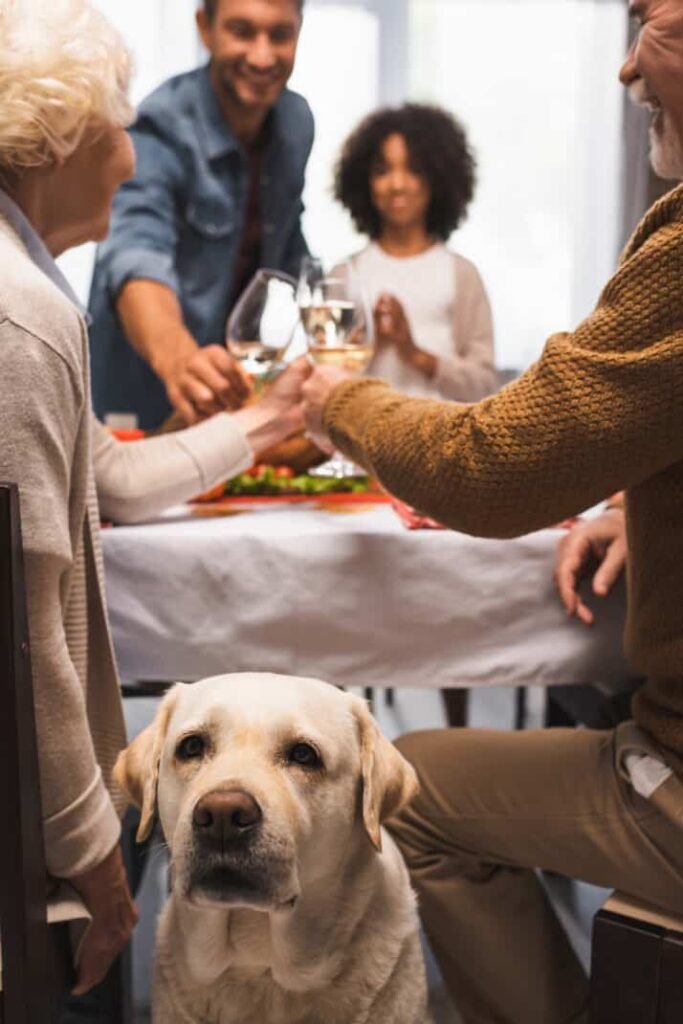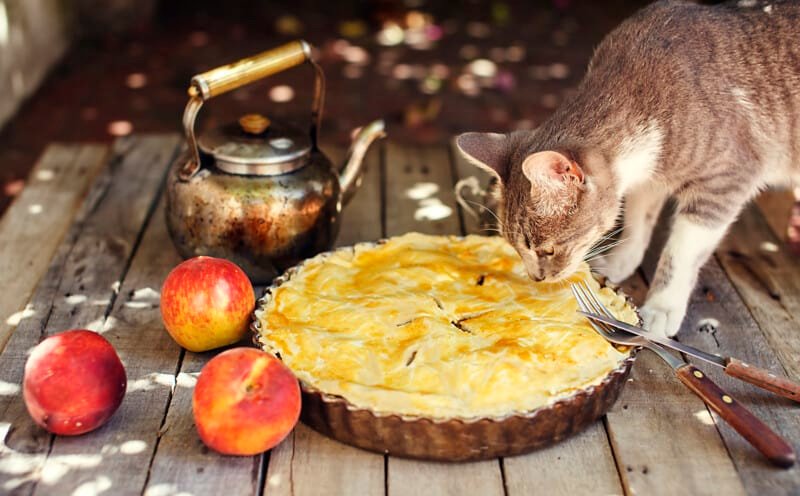The holiday season is often a time for indulgence—whether it’s sharing a festive meal with family or treating yourself to that extra slice of pie. But for pet owners, it’s crucial to remember that many of the delicious holiday foods we enjoy can be harmful, or even fatal, to our furry companions. While it’s natural to want to spoil them with a little taste of the feast, it’s best to avoid sharing certain treats. Here’s a guide to 10 common holiday foods that are dangerous for pets and what you should keep away from their curious paws.
1. Poultry Bones
Turkey and chicken bones are a staple at many holiday tables, but they pose a major hazard to pets. When cooked, poultry bones become brittle and can splinter easily. If your dog or cat chews on them, these sharp fragments can cause punctures or blockages in the digestive tract, potentially leading to serious, life-threatening injuries. Always dispose of bones immediately after carving the turkey, and clear the table quickly after meals to prevent your pet from snacking on them.
2. Turkey Skin
Turkey skin may be a tempting treat, but it’s high in fat, which can be hard for pets to digest. Fatty foods like turkey skin can lead to pancreatitis, a painful condition that causes vomiting, diarrhea, and lethargy. While a little bit might not seem harmful, it’s better to avoid giving pets this rich, greasy offering altogether. Stick to a small portion of lean, plain turkey meat if you want to share.
3. Alcohol
While we may enjoy a glass of wine or a holiday cocktail, alcohol is far more toxic to pets than we often realize. Even small amounts of alcohol—whether from beer, wine, or mixed drinks—can cause serious health problems in animals. Symptoms of alcohol poisoning include staggering, slowed breathing, and in extreme cases, coma or death. To keep your pet safe, ensure that alcoholic drinks are kept far out of reach, especially when hosting guests.

4. Onions and Garlic
Onions, garlic, and related foods (such as chives and leeks) contain compounds known as thiosulphates, which are highly toxic to dogs and cats. These compounds can cause damage to red blood cells, leading to hemolytic anemia—a condition where the body cannot properly produce healthy red blood cells. Symptoms of onion or garlic poisoning include vomiting, diarrhea, lethargy, and pale gums. Be especially cautious with foods like stuffing or gravies, which may contain these ingredients.
5. Macadamia Nuts and Other Nuts
Nuts may seem like an innocent snack, but several types pose risks to pets. Macadamia nuts are particularly dangerous and can cause severe symptoms, including vomiting, tremors, and weakness in dogs. Even nuts like pistachios, almonds, and walnuts are rich in fats, which can lead to pancreatitis in pets. Additionally, large nuts can present a choking hazard or cause intestinal blockages, particularly in smaller animals. Avoid giving your pet any nuts, no matter how delicious they look.
6. Chocolate
Chocolate is perhaps the most well-known toxic food for pets, and during the holidays, it’s everywhere—from baked goods to gift baskets. Chocolate contains theobromine and caffeine, both of which are highly toxic to dogs and cats. Dark chocolate and cocoa powder contain the highest levels of these substances, while white chocolate has the least. Even small amounts can cause symptoms like vomiting, diarrhea, and seizures, so it’s important to store chocolate products securely away from your pets.
7. Grapes and Raisins
Although grapes and raisins may seem harmless, they are extremely dangerous for dogs. Even a small amount can lead to acute kidney failure, which can be fatal. The exact toxin responsible for this reaction remains unidentified, but it’s clear that pets—especially dogs—should not be given any grapes or raisins, even in holiday desserts or snacks. If your pet does ingest them, seek immediate veterinary help.
8. Raw Dough and Yeast
Raw dough, such as the kind used for bread or rolls, can be a surprising danger for pets. If consumed, the yeast in the dough can continue to rise inside your pet’s stomach, leading to bloating, severe pain, and even rupture of the stomach in extreme cases. Additionally, the fermentation process creates alcohol, which can be toxic to animals. Always keep raw dough out of reach and never let your pet nibble on it during holiday baking.

9. Nutmeg
Nutmeg is a common spice in holiday foods, particularly in pies, cookies, and eggnog. However, it contains a compound called myristicin, which can cause hallucinations, seizures, and other central nervous system problems in pets. In large doses, nutmeg can even lead to death. While small amounts may not cause significant harm, it’s best to keep nutmeg-flavored treats and beverages away from your pets.
10. Milk and Dairy Products
Many pets are lactose intolerant, meaning their bodies don’t produce enough of the enzyme lactase to properly digest dairy products. This can lead to digestive upset, including diarrhea and stomach cramps. While some pets may tolerate small amounts of cheese or yogurt, it’s safer to avoid giving them milk, ice cream, or other dairy-heavy foods during the holidays. Stick to pet-friendly treats that are specially formulated for their digestive systems.

Healthier Holiday Alternatives for Pets
If you can’t resist those puppy-dog eyes during your holiday meal, there are safer ways to share the spirit of the season with your pets. Plain turkey (without the skin or seasoning), sweet potatoes (without sugar or spices), and green beans are all pet-friendly options that can be enjoyed in moderation. You can also stuff a KONG toy with a small portion of these foods to keep your pet entertained while you enjoy your meal. Remember, the key is moderation and avoiding foods that could cause harm.
Conclusion
While it’s tempting to share the festive delights with your furry friends, it’s important to be aware of which foods can pose serious risks to their health. By keeping these 10 dangerous foods away from your pets, you can help ensure a safe and enjoyable holiday season for everyone. If your pet accidentally consumes something harmful, don’t hesitate to contact your vet or an emergency pet poison hotline. Wishing you and your pets a happy, healthy, and safe holiday season!


